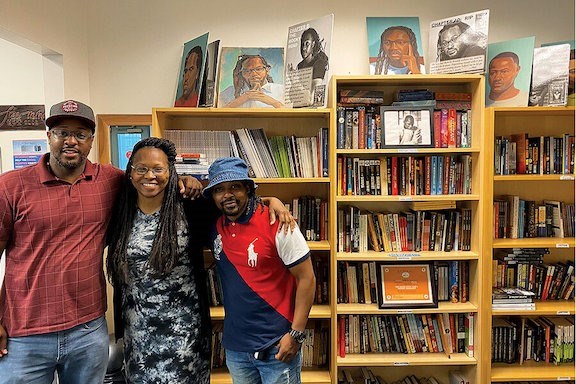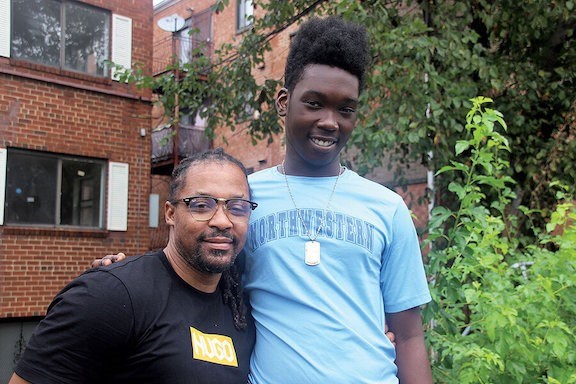REPRINTED WITH PERMISSION FROM THE CHRISTIAN SCIENCE MONITOR
 Craig Watson (left), Keela Hailes (center), and Shannon Battle – seen here at the office of Free Minds Book Club & Writing Workshop in Washington on June 21, 2021 – form a network of support for formerly incarcerated individuals.Erika Page/The Christian Science Monitor
Craig Watson (left), Keela Hailes (center), and Shannon Battle – seen here at the office of Free Minds Book Club & Writing Workshop in Washington on June 21, 2021 – form a network of support for formerly incarcerated individuals.Erika Page/The Christian Science Monitor
October 1, 2021
Craig Watson only showed up at that poetry workshop back in 2015 because his prison compound’s championship basketball game was canceled. “I was just sitting there, like, ‘I don’t write poems. I don’t rhyme,’” he recalls, chuckling.
The facilitator from Free Minds Book Club & Writing Workshop told him to forget about rhyming and just express himself. The blank page in front of him began to fill up. Poetry offered an outlet for expressing difficult feelings about a childhood marked by violence. During community “write nights,” Free Minds members gave him positive feedback, and he began to lean into that network of support.
Free Minds, founded in 2002, operates book clubs and writing workshops in prisons around the United States and at the jail and juvenile detention center in Washington, offering constructive connections among its nearly 2,000 members. Members never “graduate” but remain part of the organization for life; thousands are on its waitlist. When incarcerated people are released, Free Minds helps them find their feet back home through its reentry program.
When Mr. Watson returned from prison through the Second Look Amendment Act in 2019, he had 22 years of catching up to do. Free Minds helped him with practical things, like finding his first job, but most important, the organization became an extended family that kept Mr. Watson from becoming another statistic.
Every year, the U.S. releases 7 million people from jail and more than 600,000 from prison. Of the latter, more than two-thirds are rearrested within three years. Many return to communities of historical underinvestment with limited education and weak social support. Criminal records make the job search difficult, and drug use and suicide rates are high, according to a report by the Office of Disease Prevention and Health Promotion.
Free Minds offers its 330 reentry members workshops, coaching, counseling, group support, and connections to opportunities. But during the pandemic, Mr. Watson, who was serving as a Free Minds poetry ambassador, noticed he wasn’t hearing from a lot of reentry members.
So in January, he presented his idea: a formalized peer support program, with the goal that every reentry member would have someone to talk to who had been through it themselves. Today, Mr. Watson is one of 12 peer supporters guiding others through the emotional and logistical challenges of starting over after incarceration. That level of peer involvement is key to the success of reentry, experts say.
“The promise of these [reentry] programs lies in the street cred of the mentors,” says Dr. Nancy La Vigne, a criminologist with the Council on Criminal Justice. “People are more likely to listen to and follow the lead of someone who’s walked in their shoes. ... I think they can reach people who might not otherwise be reachable.”
 Erika Page/The Christian Science MonitorShannon Battle (left) and Davonta McBride, seen outside Davonta’s home in Washington, Aug. 20, 2021, met through a Free Minds meeting.
Erika Page/The Christian Science MonitorShannon Battle (left) and Davonta McBride, seen outside Davonta’s home in Washington, Aug. 20, 2021, met through a Free Minds meeting.
A listening ear
Mr. Watson traces his journey as a peer supporter back to a time in solitary confinement in 2005. In many prisons, incarcerated people sent to solitary confinement end up doubled up in cells together. His cellmate had just learned of the death of his mother. Mr. Watson sat with the man, though he barely knew him. The two talked, heart to heart. Mostly, Mr. Watson listened. When his time in solitary confinement ended, Mr. Watson voluntarily stayed longer, to be there for his new friend.
“I know how important it is to have somebody when you’re going through something,” says Mr. Watson.
In May, the first class of Free Minds peer supporters completed a three-month training course, where they learned how to care for others while also paying attention to their own needs. Over two dozen reentry members have already expressed interest in joining the next class in October.
“The prison system is designed to break ties, to separate the person who is incarcerated from their community,” says Tara Libert, co-founder and executive director of Free Minds. She says that peer support does the opposite. “They repair, restore, and create new community connections which are essential to successful reentry.”
The peer supporters work alongside three full-time reentry coaches, who recommend names of people who might need extra attention via a phone call or a visit. Sometimes, the members simply want to celebrate a new job or recount the score from a child’s sports game. Other times, they need help working through relationship problems, loneliness, or post-traumatic stress.
“We know the problems of the young people out in the streets,” says Mr. Watson, who got the keys to his first apartment in September. “We want to give back to these communities that we once destroyed when we were young.”
The peer supporters say that helping others helps them heal, too.
“After talking with them, we understand what our family was going through – our mothers, our sisters, our brothers,” says Mr. Watson. “That’s where that connection really builds.”
Page created on 12/22/2021 7:37:49 PM
Last edited 12/22/2021 7:50:46 PM
